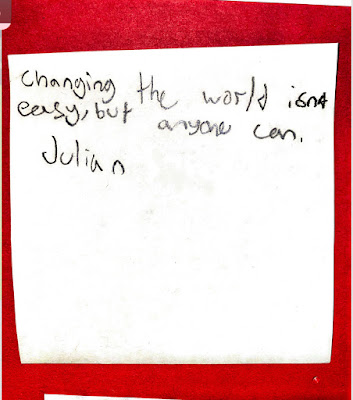 |
| Sample Work from Mr. Roselli's 8th Grade Ethics Class |
Planning an Eighth Grade Ethics Curriculum at a Private School in Queens
I taught the 8th Graders every Tuesday as part of my teaching load this past school year. I teach at a private, independent school in the Jackson Heights neighborhood of Queens. The kids are receptive to learning - albeit a rowdy bunch. The class was split into two. So basically I saw each group every other week. The class was PASS/FAIL and I put a lot of emphasis on student participation, talking, and group work. I uploaded content for them to read and view on Google Classroom so I did not have to spend a lot of time going over the material in class. Here is a short overview of one particular lesson I did (with some student work).
Reading Plato's Allegory of the Cave in a Middle School Ethics Class
We read Plato's cave in class - using a lesson I had created (and which you can access
here). The kids were in eighth grade - so they would be thirteen or fourteen years old.
Kids' Understanding of Plato's Ideas
 |
| Students jot down their summary ideas to get the gist. |
The one takeaway I noticed with this age group is that they totally "got" the idea of most people's inability to change a mindset and think through a different perspective. I feel like that is indicative of the age group - most kids that age have difficulty understanding and processing different points of view. They recognize others' points of view, but since they are often self-focused and not other-focused, they spend a lot of energy and anxiety over whether or not people "get" their point of view. They desperately want to be understood (which is human). In this example, from student work, I had the kids present their own visual representation of Plato's cave. These three students, Isabel, Ryan, and Hayden, were very much fixated on the idea that enlightenment is pretty much impossible. Notice how they put an exit sign in the cave with the label "unachievable".
Getting Students to Jot Down Their Ideas
The lingo teachers use is "getting the gist". You are not looking for kids to pen a dissertation. But you want students to produce something written in the course of the lesson. The comments they made were original, and I liked how they understood Plato's dual reality theory. It is not an easy concept to get, but they really appreciated it. From a writing perspective, it is vital to get students to jot down their ideas - even if it is a few sentences or even a list of words. It helps the kids solidify their thoughts. And also it helps me, the teacher, to scan for student understanding.
Using Visual Imagery to Make Connections with Students
After exploring the ideas of the lesson, students can talk about the above image. What do they notice? What do they wonder? Collect the students' responses.
Class: Eighth Grade Ethics / 90 Minute Lesson (you can break it down into two separate 45-minute lessons)
Materials: paper, pencils, pen, handouts of the Allegory of the Cave, Comprehension Questions, Discussion Questions, Entrance, and Exit Tickets
 |
My TpT store has resources for
middle and high school English teachers |





